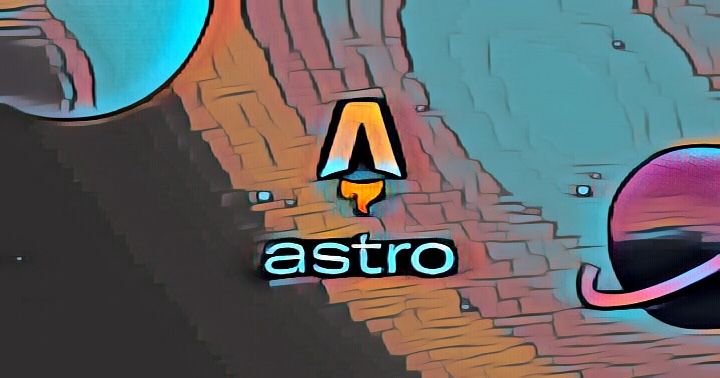
From Novice to Contributor: My Evolution with Astro
In the dynamic field of web development, where numerous frameworks vie for dominance, Astro stands out as a significant innovation. At aplicado, we’ve embarked on an enlightening journey with Astro, delving into its potential to revolutionize business websites. This article blends our professional insights with my personal development story, offering a grounded perspective on why Astro represents an important advancement in web development.
My Personal Encounter with Web Development
My journey into web development was a path filled with curiosity and challenges. As a junior developer, I sought a platform that was not only easy to learn but also grew in complexity and capability as my skills developed. This desire for a progressive learning curve led me to sift through various frameworks and tools. Initially, I explored user-friendly solutions like WordPress and Wix, drawn to their simplicity. However, I soon realized their limitations, such as their restrictive nature and performance issues. This was a pivotal moment, prompting me to look beyond the surface ease of use and delve into what truly makes a robust and scalable web development environment.
Discovering Astro
My exploration brought me to Astro. What struck me first was its balance of user-friendliness with profound, under-the-hood capabilities. My journey with Astro was not a smooth road; it was marked by a significant challenge that became a turning point. During my exploration of Astro, I stumbled upon a perplexing bug that prompted me to reach out to the Astro community for support. This led to a collaborative effort with Nate Moore, Astro’s co-creator. Together, we embarked on a journey to unravel the mystery of this bug. After thorough investigation and teamwork, we discovered that the issue was, in fact, a memory leak within Astro itself. This revelation was pivotal – not just for my project, but for the Astro framework as a whole. Nate swiftly addressed this by making a pull request on Astro’s GitHub repository, culminating in the bug fix in patch 3.0.0-rc.9. This incident didn’t just contribute to Astro’s enhancement; it also marked a significant milestone in my development career. My involvement in identifying and resolving this critical issue led to the betterment of Astro and earned me recognition as a ‘Contributor’ in the Astro community, a testament to the positive impact one can have in the open-source world.
Astro vs. Other Frameworks: A Comparative Analysis
Exploring Astro, I also experimented with other frameworks like Gridsome and Next.js. The experience was enlightening; Astro offered a more streamlined and efficient development process, especially regarding performance. For example, while Next.js is a robust framework, it often demands extensive configuration and server-side resources. Astro’s approach to static site generation, on the other hand, results in quicker load times and optimized performance, presenting a clear advantage in developing fast and responsive websites.
Navigating the Challenges with Astro
Astro’s innovative approach comes with its own set of challenges, which are more opportunities for growth rather than setbacks. A significant aspect of using Astro is the need for coding knowledge, distinguishing it from no-code or low-code solutions. This requirement, rather than being a barrier, is a chance to delve deeper into web development, allowing developers to craft more refined and powerful web solutions. Additionally, Astro’s evolving nature, being a relatively new entrant in the web development space, means regular updates and adapting to changes. However, this dynamism is part of its charm, offering a chance to be at the forefront of web development innovations and part of an actively growing community.
Why Not Just Use No-Code or Low-Code Solutions?
In the business world, no-code and low-code solutions like Webflow and Duda are often tempting for their simplicity. However, they come with significant drawbacks in terms of flexibility, performance, and SEO optimization. The journey with Astro highlighted its intrinsic advantages over traditional web development methods. Its performance, flexibility, and community-driven development model offer a refreshing contrast to the often rigid and closed nature of other platforms. Astro’s approach to web development aligns with the evolving needs of businesses and developers alike, advocating for a more dynamic and responsive web experience.
Astro’s Ecosystem and Community Support
One of Astro’s most compelling features is its vibrant community and ecosystem. This living network, akin to the aorta artery, is the lifeblood of Astro’s rapid growth and continuous improvement. It’s this community-driven development that makes Astro not just a tool, but a thriving platform for innovation.
Embracing New Horizons with Astro
While Astro can be seen as a significant step forward in web development, it’s essential to present a balanced view. Its ability to support multiple JavaScript SPA frameworks and the unique ‘dynamic islands’ feature sets it apart, offering an optimized balance between SPA-like user experience and strong loading performance. This contrasts with other frameworks that may require learning a new language or lack this level of versatility and performance optimization. At aplicado, we view Astro not just as a tool but as an ally in crafting state-of-the-art digital solutions.